The Ring of the Legendary King Minos in the Archaeological Museum of Heraklion; Read its story.
The Ring of Minos is a gold seal ring, dated to be approximately 3500 years old (1500 – 1400 BCE)
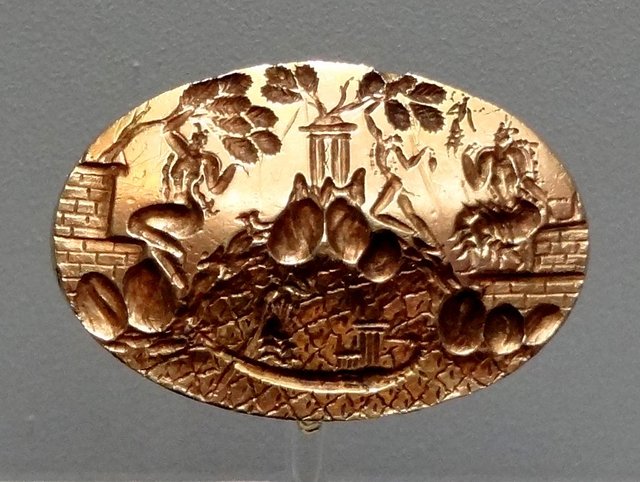
After being found in the late 1920s, it remained lost for 73 years until it was given to the authorities in 2001 and in 2002, a Greek & international committee after careful examination, proved its authenticity.
The story described below is found at the blog of Mr Vasilakis who is a researcher of prehistoric writing and a relative of the child who originally found the ring.

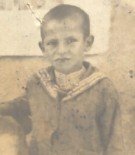
His mother had told him after delivering the food to his father, to go and get the goat from another area from his sister’s field.
(Image by kairatos.gr - Vlychia Knossou. The arrow points to where the ring was found and the square to the point where a Minoan Tomb was excavated after a few years)
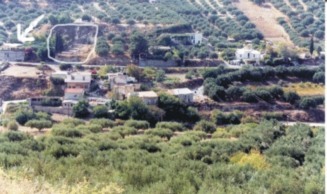
The story starts to get more interesting, because young Michalis on the way to show the ring to his mother met his mother’s friend “Theodora” and after showing her the ring, she thought it was appropriate to share this information with someone who worked at Knossos, who eventually told to Evans.
Evans and people sent by him would go to the house of Michalis to ask for the ring, but his parents for 2.5 years denied its existence.
This the reason Arthur Evans tried to retrieve more information by a priest who was also a friend of the family.
The priest who used to visit the family often, managed to retrieve the info as to where the ring was buried and he asked the mother of Michalis to fetch it, which she did.
During a few minutes that he was left alone with the ring, the priest managed to take the print of it and did his best to
persuade the family to sell it to Evans. Eventually he offered them a significant amount of money and took the ring. The ring had a mark by ‘tsaprazi’(a curved-blade knife with fine teeth), done by the father in order to be able to recognize it.
And the story of the ring continues, as the priest was asking astronomical amounts to sell the ring to Evans. However Evans did not buy it, but managed to make a ‘ring's shape’ and ordered Gillieron Fils to create a replica.
As per the blog of kairatos.com years later, the priest was arrested with the ring, and it was returned to Heraklion’s Museum. The Archaeologist N. Platon after making a replica of the ring (out of plaster), called the father of the young boy who found the ring, Emmanouil Papadakis who claimed that even though the priests’ ring appeared to be the same it did not have his mark. So the ring was returned to the priest as being considered not authentic.
G. Kazantzis. The person who found the ring and gave back to the state. - source kairatos.com
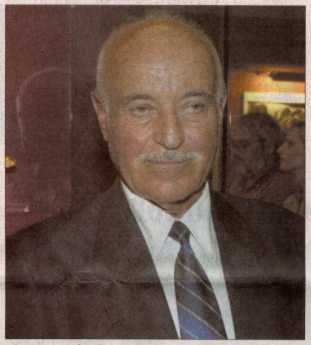
As Mr Vasilakis writes in his blog, at the moment 2 replicas are located in Oxford Ashmolean Museum and the authentic one is the one at the Archaeological Museum of Heraklion. One of them is a replica created by Gillieron Fils (ordered by Evans) and the other one was provided by Evans even though it is not quite clear how Arthur Evans managed to take the ring abroad. The Priest (prior to his death) had confessed to the mother of the child who found the ring that he had eventually sold it to Evans. Apparently he has created a replica which he sold to Evans, holding the authentic one for himself.
As per an article in kathimerini Mr Kazantzis, who was inherited a house by the priest, found the ring during the restoration of that house.
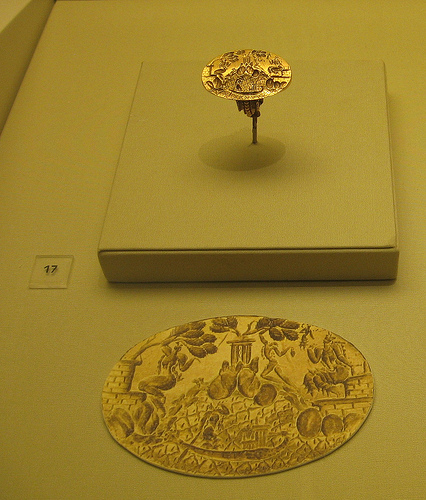
On Tuesday, July 23rd in 2002 a special ceremony took place with the former Minister of Culture for the ring to be attributed in Heraklion Archaeological Museum. It is now located in the first floor of the Heraklion Museum.
A committee of Greek and foreign experts agreed upon the authenticity of the ring, after numerous tests conducted. This seal ring is considered one of the most expensive of its kind, due to its great historical value.
The ring is from pure gold (weigh: 29.4 gr) and the representation is divided in two levels.
The lower level depicts the sea, being crossed by a boat. In the boat there is a woman's figure probably puddling. Around the sea we can note three shore parts. On the right side there is a tree, that a woman's figure is trying to pull down. On the middle we probably see an altar with a tree on it; that tree is again being pulled by a smaller figure. On the other side we see a figure sitting on a settlement. Between this figure and the centric figure there is a female small figure who seems to descend from the sky or to be in the sky.
According to Dr Minas Tsikritzis’ interview at the local channel Kriti TV, what we see in the ring in simple words are:
At the center there is a mountain, while there are two persons with a tree, one of them holding a vessel.
The characteristics of the people on the ring as so clear that most probably they used some sort of lenses in order to carve them.
The people going up to the mountain, are from the eastern side and mount Youchtas that is known as Zeus Mountain is only reachable from the east.
According to the paper in academia.edu by Mr Antonis Vasilakis it appears that on the left side it is about the worship of mother Dimitra with specific rituals, while there are offerings to the Big Mother Rhea and to Big Mother Artemis.
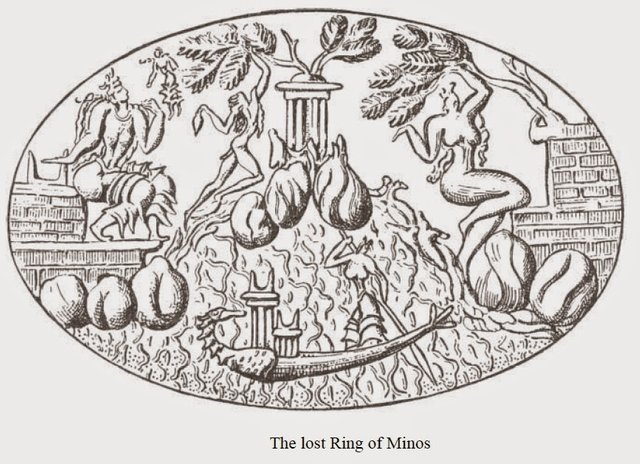
The ring’s images depict a number of epiphany stages, meaning the coming of the Goddess in the real world.
There is a woman's figure at the left who is holding the tree. At the middle of the ring there is a figure also holding a tree. Dendrolatry,the worship of the trees, is something usual in the Minoan Civilization. The Minoans used to believe that the trees were Gods and considered them to be the source of life.
It is not clear who used to wear this ring, but it was owned by a very powerful man. The ring is mostly known as 'King Minos Ring', but there is no evidence of this.

Minos, according to Greek Mythology, was the son of Zeus and Europa and presumably he was the first King of Crete.
His name appears in Homer’s Iliad and Odyssey and according to Thucydides, Minos was the first man known to build a navy.
We will tell his story in a future post : )

Disclaimer: I have tried to gather information in order to determine the story of the ring and how after being found by a child in 1928, it managed decades afterwards to be hosted in the Archaeological Museum, for every one to be able to admire its glorious representations. There are many details with names, dates, actions that I considered they should not be included but they are all available at the sources below.
Thank you for taking the time to visit and read my post.
source : Wikipedia
source : kairatos.com
source : kairatos.com
source : kathimerini.gr
source: naisinous.com
source : academia.edu
source: Museums of Greece by Zambia Pateraki
source : biroz.net for further intepretations and details
source: Patris Newspaper:
Very interesting, but also amazing that the ring survived that long without the details being worn away (since gold is soft). Thanks for the post.
Yes, it is impressive. This perhaps one of the reasons they first thought it was not authentic.
Thanks for dropping by :)
kai meta s lene gia game of thrones, edo ginete xamos, opoios to pianei to 8elei :P
Καλημέρα πολύ ωραίο το έκανα resteem ...
Καλημέρα Νίκο, πολύ σ' ευχαριστώ!
Upvoted nice post keep it up
I really like this post katerinaramm!
Congratulations @katerinaramm! You have completed some achievement on Steemit and have been rewarded with new badge(s) :
Click on any badge to view your own Board of Honor on SteemitBoard.
For more information about SteemitBoard, click here
If you no longer want to receive notifications, reply to this comment with the word
STOP